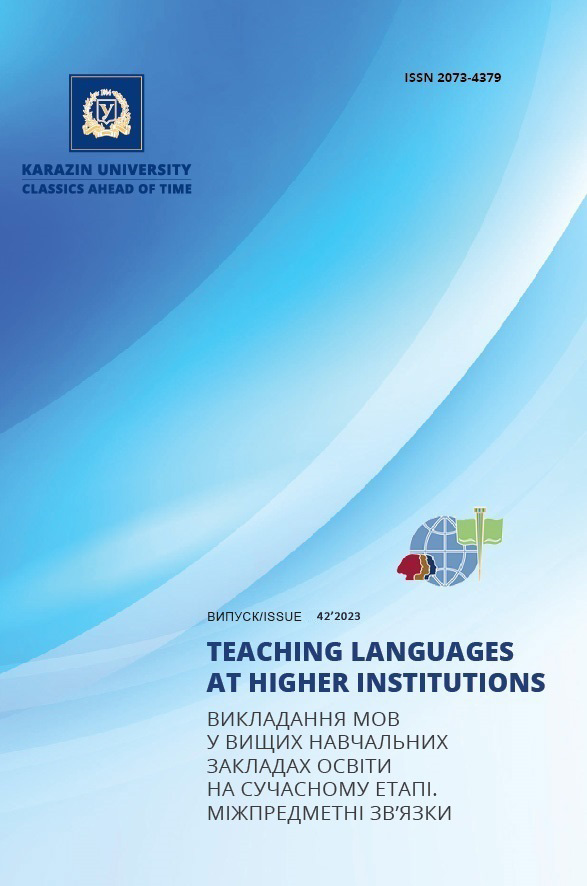Лінгводидактичні особливості викладання іноземних мов у кризових ситуаціях: досвід закладів вищої освіти України
Анотація
Сучасні євроінтеграційні процеси актуалізують значення іноземних мов в мультикультурному суспільстві, а їх ефективне викладання відповідно є одним із пріоритетних завдань європейської мовної політики, реалізація якої значно ускладнюється в умовах кризового стану, в якому на разі перебуває Україна.
Однією із передумов підвищення рівня іншомовної освіти та виходу із кризових ситуацій є вивчення позитивного передового досвіду країн з метою його вдосконалення та імплементації кращих здобутків науково-педагогічних працівників у галузі лінгводидактики та методики викладання іноземних мов в освітній процес. Зазначене вище зумовило мету дослідження – узагальнити та систематизувати досвід викладання іноземних мов у закладах вищої освіти України, визначити його лінгводидактичні особливості в умовах кризових ситуацій.
У статті проаналізовано досвід викладання іноземних мов у закладах вищої освіти України у кризових ситуаціях. У межах досліджуваного періоду виокремлено ковідний та воєнний етапи, для кожного із яких були характерні лінгводидактичні особливості викладання іноземних мов. Під час ковідного періоду викладання іноземних мов характеризувалося активною розробкою та опануванням викладачами онлайн-курсів, що характеризувалися завершеним набором мети, змісту, форм, методів і засобів навчання для здійснення іншомовної комунікації, налаштування освітнього контенту відповідно до специфічних особливостей освітнього компонента «Іноземна мова». Зʼясовано, що викладання іноземних мов у закладах вищої освіти у воєнний період відбувалося у синхронному, асинхронному та змішаному варіантах організації дистанційного навчання іноземної мови. Серед лінгводидактичних особливостей зазначеного періоду визначено застосування гнучких підходів до організації конструктивної комунікації між учасниками освітнього процесу, створення «ситуацій успіху» під час виконання творчих проєктів, значним розширенням дидактичного репертуару викладача щодо використання цифрових технологій залежно від їх функцій (тренувальної, комунікативно-кооперативної, пошуково-інформаційної, презентаційно-дослідницької, експериментальної, гейміфікаційної) та зміни його ролі у якості коуча, інтернет-модератора, відеотьютора, фасилітатора комунікації.
Завантаження
Посилання
Buzhykov, R.P. (2011). Dydaktychnyj potencial Internet-tekhnologhij v suchasnij systemi osvity. [Didactic potential of Internet technologies in the modern education system]. Problemy osvity [Problems of education]. Kyiv, 66, P. II, pp. 41–42 [in Ukrainian].
Bulenok, S.M., Kovalenko, L.V. (2022). Vykorystannja dystancijnykh tekhnologhij u procesi navchannja ghramatyci inozemnoji movy studentiv nemovnogho VNZ [The use of distance technologies in the process of teaching foreign language grammar to students of a non-language university]. Materialy mizhvuz. nauk.-metod. seminaru “Vykorystannja dystancijnykh osvitnikh tekhnologhij u vykladanni inozemnykh mov” [Interuniversity materials. science and method seminar “Using distance educational technologies in teaching foreign languages”]. Kyiv: State University of Trade and Economics, pp. 15–17 [in Ukrainian].
Vdovychyn, T.Ya., Kogut, U.P., Sikora, O.V. (2022). Google digital tools for organization of the pedagogical universityʼs educational process in crisis situations. Information Technologies and Learning Tools. Vol. 92, 6, pp. 75–98. DOI: https://doi.org/10.33407/itlt.v92i6.5093 [in Ukrainian].
Halytska, O., Lozytska, M. (2022). The main directions of information and communicationtechnologies implementation in the process of teachinggerman to students of philology. Informacijni texnologiyi i zasoby navchannya. Vol. 88, 2, pp. 56–63. DOI: https://doi.org/10.33407/itlt.v88i2.4686 [in Ukrainian]
Kaluhin, R. (2022). A roadmap for online course development to blended learning of master students. Physical and Mathematical Education. Vol. 35, 3, pp. 33–40. Available at: https://fmo-journal.org/index.php/fmo/article/view/185 [Accessed 24 Dec. 2022]. DOI: https://doi.org/10.31110/2413-151-2022-035-3-005 [in Ukrainian]
Kohut, U., Sikora, O., Vdovychun, T. (2022). Challenges of studying and teaching in war conditions. Youth & Market. 5 (202), pp. 83–88. DOI: https://doi.org/10.24919/2308-4634.2022.260171 [in Ukrainian]
Krekoten, O.V. (2018). Vykorystannya socialnyx merezh u vyvchenni inozemnyx mov studentamy texnologichnyx specialnostej [The use of social networks for learning foreign languages by students of technological specialties]. Naukovi zasady pidgotovky faxivciv pryrodnychogo, inzhe nerno-pedagogichnogo ta texnologichnogo napryamkiv: materialy II Vseukrayinskoyi naukovo-praktychnoyi internet-konferenciyi [Scientific principles of training specialists in natural, engineering-pedagogical and technological fields: materials of the II All-Ukrainian scientific and practical internet conference]. Berdyansk: BDPU, pp. 114–116 [in Ukrainian]
Maryenko, M., Suhih, A. (2022). Organization of the educational process in institutions of general secondary education by means of digital technologies during martial law. Ukrainian Educational Journal. 2, pp. 31–37. Available at: https://uej.undip.org.ua/index.php/journal/ article/view/595 [Accessed 15 Dec. 2022]. DOI: https://doi.org/10.32405/2411-1317-2022-2-31-37 [in Ukrainian]
Osova, O. (2022). Features of designing a distance foreign language course in higher education institutions. Materials of the 4th Intern. sci.-pract. conferences “Modern research in world science”. Lviv, pp. 571–575 [in Ukrainian]
Osova, O.O. (2021). Methods of productive group teaching of students in foreign language classes: a study guide for students of I and II levels of higher education. Kharkiv: FOP Brovin O.V. [in Ukrainian]
Resolve the Cabinet of Ministers. No. 211. On preventing the spread of acute respiratory disease COVID-19 caused by coronavirus SARS-CoV-2 in Ukraine. Available at: https://zakon.rada.gov.ua/laws/show/211-2020-%D0%BF#Text [Accessed 26 Oct. 2022] [in Ukrainian].
Decree of the President of Ukraine on the introduction of martial law in Ukraine. Available at: https://zakon.rada.gov.ua/laws/show/64/2022#Text [Accessed 27 Nov. 2022] [in Ukrainian].
Digital Agenda of Ukraine – 2020. Conceptual principles. Priority areas, initiatives, projects of digitalization of Ukraine until 2020. (2016). Available at: https://ucci.org.ua/uploads/files/58e78ee3c3922.pdf [Accessed 03 June 2022] [in Ukrainian]
Google digital tools for education: On July 25, training for educators, teachers and professors begins. Available at: https://mon.gov.ua/ua/news/cifrovi-instrumenti-google-dlya-osviti-25-lipn ya-rozpochinayetsya-navchannya-dlya-vihovateliv-vchiteliv-i-vikladachiv [Accessed 10 Jan. 2023] [in Ukrainian].
Baibekova, L., Holubnycha, L. (2020). Modern technologies for university studentsʼ language learning in pandemic. Postmodern openings. No 11 (2), pp 59–65. DOI: https://doi.org/10.18662/po/11.2/158.
Khomyshak, O. (2022). Using digital learning technology in the process of linguomethodological training of future foreign language teachers. ІCT and learning tools in the higher education establishments. Vol. 88, 2, pp. 38–55. DOI: https://doi.org/10.33407/itlt.v88i2.4654.
Kotova, A., Serdiuk, V., Avdieienko, I., Lenska, O, Ivaniga, O. (2020). Integration of Content and Language Integrated Learning elements in the Education of Nonlinguistic Specialty Students by means of it. Integration. Education. Proceedings of the International Scientific Conference. Vol. 3, pp. 134–144.
Maiier, N., Yukhymenko, V. (2022). Mobile technologies in the development of professionally oriented English speech interaction competence in information systems and technology military students. ІCT and learning tools in the higher education establishment. Vol. 2 (88), pp. 115–125. DOI: https://doi.org/10.33407/itlt.v88i2.4830.
Vakaliuk, T., Osova, O., Chernysh, О., Baskir, O. (2022). Checking digital competence formation of foreign language future teachers using game simulators. ІCT and learning tools in the higher education establishments. Vol. 90, 4. DOI: https://doi.org/10.33407/itlt.v90i4.4816¬.

